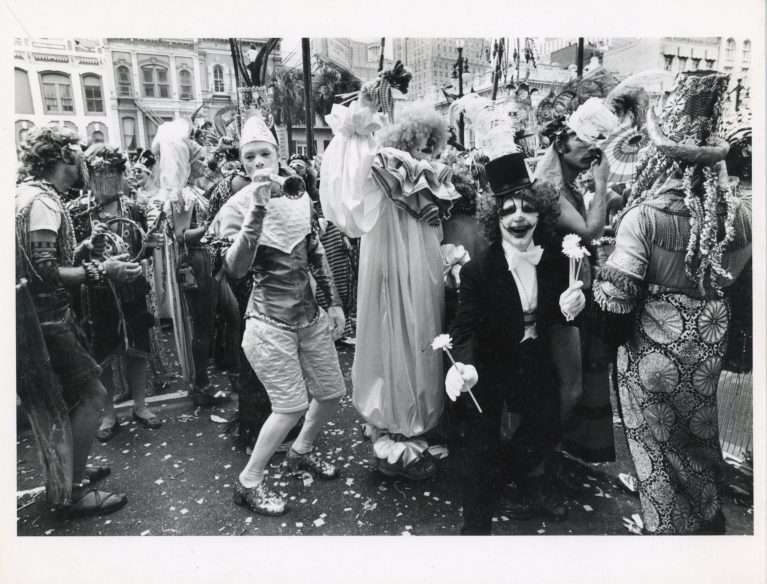Español abajo
Explore texture and wrapping in this O-riginal Art Activity inspired by Sharon Kopriva.
Download Activity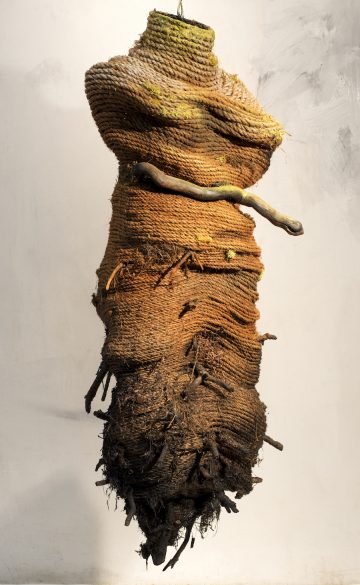
Sharon Kopriva, Earth Mother, 2015, Rope and mixed media, 60″ x 20″ x 17″
Sharon Kopriva, a Texas native, who currently works in Houston, Texas and Hope, Idaho. Sharon combines two-and three dimensional media with fusions of papier-mâché and found objects. Her career has taken her through investigations of pre-Colombian cultures in Peru, examinations of her Catholic faith, and inspirations from the spiritual forests of the beautiful Pacific Northwest.
Supplies
Plastic Bottle, Scissors, Tape or Glue, String or Color Paper, Markers or Paint
Instructions
Step 1: Use a plastic bottle or found object for the base of your sculpture. Be sure to ask your parent or guardian for permission to make art with your found object.
Step 2: Choose your material for wrapping. Think about what texture and color you want your sculpture to have. Examples of materials to use: string, paper, pipe cleaners etc. If you choose to use paper, use scissors to cut the paper into strips. To create additional texture roll the strips into “string”.
Step 3: Tape or glue the material strips together into one long strip.
Step 4: Start at the top of your object. Use tape or glue to attach the material to the top of your object. Wrap the object; be sure to wrap it tightly. If you run out of material before you get to the bottom of your object, tape or glue that piece in place. Start again with another piece of material. Continue until you have completely covered the object.
Step 5: Consider adding layers and more texture to your object by wrapping it with another layer of the same or different material if available.
Step 6: Add color to your object with markers or paint.
Vocabulary
Found object — a thing that someone else has given or thrown away that is often repurposed by artists
Sculpture — an artwork made from materials such as glass, wood, clay, metal that is 3D
Texture – the surface quality of a work of art
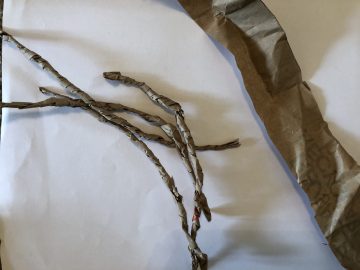
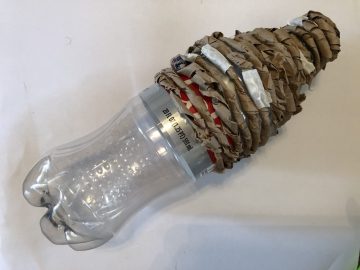
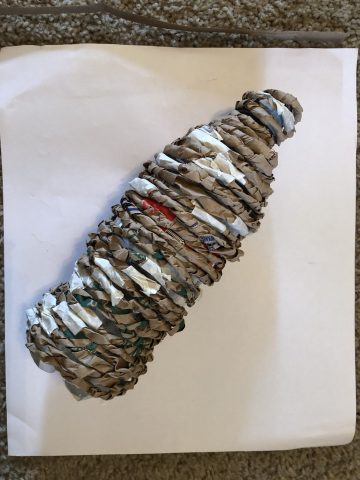
___________________________________________
Actividades artísticas O-riginales: Escultura envuelta
Inspirada por Sharon Kopriva

Sharon Kopriva, Earth Mother, 2015, Rope and mixed media, 60″ x 20″ x 17″ | Sharon Kopriva, Madre Tierra, 2015, cuerda y técnica mixta
Sharon Kopriva, oriunda de Texas, trabaja actualmente en Houston, Texas y en Hope, Idaho. Sharon combina técnicas bidimensionales y tridimensionales con fusiones de papel maché y objetos encontrados. Su carrera la llevó a investigar culturas precolombinas en Perú, a examinar su fe católica y a buscar inspiración en los bosques espirituales en el bello pacífico noroeste.
Materiales
Botella de plástico, tijeras, cinta adhesiva o pegamento, cuerdas o papeles de colores, marcadores o pintura.
Instrucciones
Paso 1: Utiliza una botella plástica o un objeto encontrado como base de tu escultura. Asegúrate de contar con el permiso de tus padres o tutores para hacer arte con el objeto encontrado.
Paso 2: Elige un material para envolver. Piensa en la textura y el color que quieres que tenga tu escultura. Ejemplos de materiales a utilizar: cuerdas, papel, limpiapipas, etc. Si eliges utilizar papel, usa las tijeras para cortar el papel en tiras. Para crear textura adicional, enrolla las tiras formando “cuerdas”.
Paso 3: Pega con cinta o pegamento las tiras de material formando una sola tira larga.
Paso 4: Comienza por la parte superior de tu objeto. Utiliza cinta o pegamento para fijar el material a la parte cinta o pegamento para fijar el material a la parte superior de tu objeto. Envuelve el objeto: asegúrate de envolverlo firmemente. Si se te acaba el material antes de llegar al final de tu objeto, ponle cinta o pegamento en su lugar. Comienza nuevamente con otro tipo de material. Continúa hasta haber cubierto el objeto en su totalidad.
Paso 5: Considera agregarle capas y más textura a tu objeto, envolviendolo con otra capa del mismo material o uno diferente, si tienes disponible.
Paso 6: Agrégale color a tu objeto con marcadores o pintura.
Vocabulario
Objeto encontrado: un objeto que alguien donó o descartó y que los artistas reutilizan para hacer arte.
Escultura: una obra de arte 3D hecha con materiales como vidrio, madera, arcilla o metal.
Textura: la calidad de la superficie de una obra de arte.




